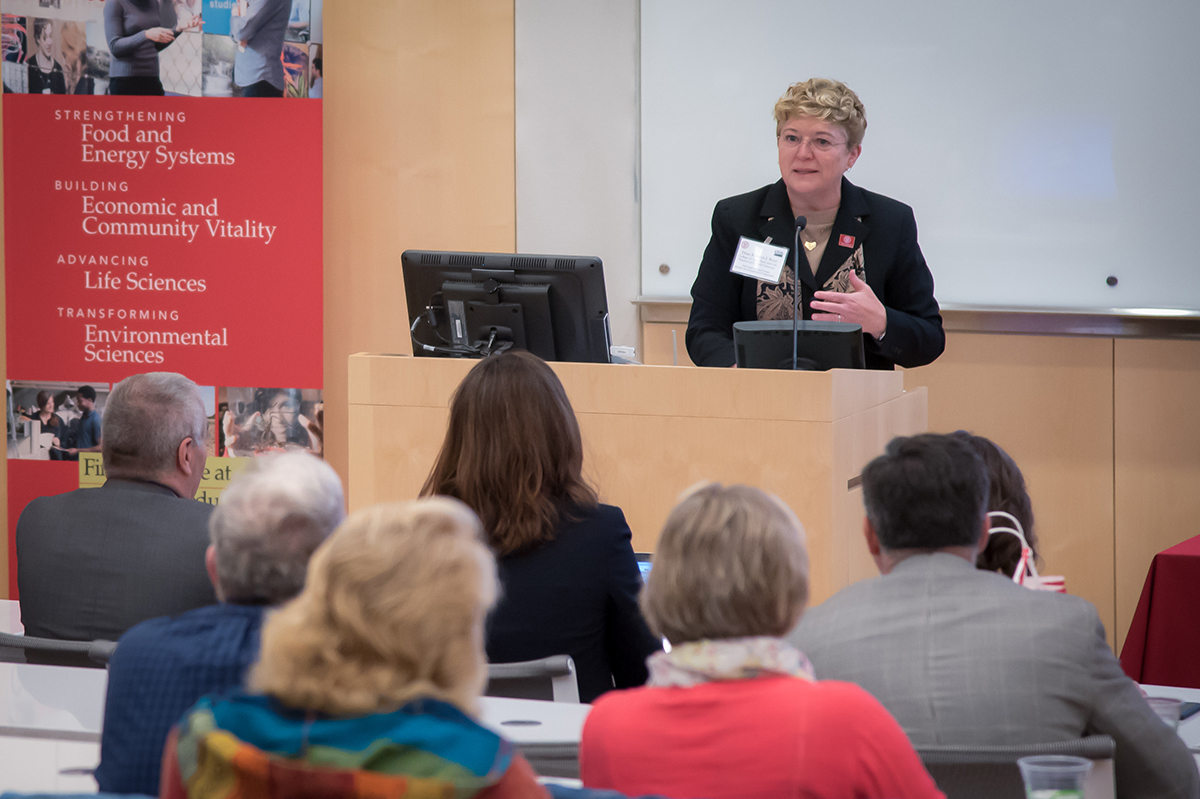Forum tackles issues facing next-generation agriculture
By Matt Hayes

When the next U.S. secretary of agriculture takes office in January, that person will consider ways to strengthen the nation’s agricultural future based in part on recommendations put forth during a forum held at Cornell.
The College of Agriculture and Life Sciences (CALS) and the U.S. Department of Agriculture (USDA) gathered leaders in farming, government, academia and private enterprise to discuss issues of land tenure and the next generation of agriculture. Recommendations from the stakeholders will be presented to the next USDA leader as she or he grapples with challenges – and opportunities – facing a new generation transitioning into the U.S. agricultural economy.
Held Oct. 3 at Stocking Hall, the forum – one of several being held this fall at land-grant universities around the nation – focused on identifying region-specific needs of new and beginner farmers and areas in which new policies can best support access to land and capital.
Cornell is the perfect stage for such discussions, according to CALS Dean Kathryn Boor.
“Cornell works closely with those in agriculture, food, energy and related fields – and in partnership with local, state and federal governments, with key foundations and with local communities – to meet emerging challenges and to seize new opportunities,” Boor said. “If we are collectively to help agriculture flourish, we need to increase the frequency of collaborations like today’s event among government, industry members, farmers and land-grant institutions such as Cornell.”
Two panels were designed to create dialogue around the critical issues of next-generation farming. An open forum led by Lilia McFarland, USDA new farmer coordinator, gave the audience a chance to voice its concerns about what needs to be done to strengthen America’s agricultural future.
Discussions touched on farm profitability and how it influences the land tenure of small farms. A common theme was “breaking down silos” – making sure agencies that exist to help farmers at any stage in their career are always communicating to other relevant agencies what they are doing.
John A. Noble ’78, president and CEO of Synergy LLC and president of Noblehurst Farms, summarized the forum’s key points, which USDA officials will present to the new administration.
“Events like today’s forum help us articulate the most urgent needs in agriculture, and develop long-range solutions that will keep this industry thriving,” Boor said.
She noted that, with nearly 20 million people living in New York state, less than 0.3 percent of the population is directly involved in production agriculture. Yet New York is one of the nation’s largest agricultural producers: the state is the third-largest producer of milk and leads the nation in yogurt, cream cheese, sour cream and cottage cheese production.
Despite the high efficiency of New York’s farmers and producers, Boor said the loss of agricultural spaces to suburbanization and the prohibitive cost of land will grow more pronounced.
Ann Mills, deputy undersecretary for natural resources and environment, said land remains a stumbling block for new agricultural entrepreneurs and noted USDA efforts during the Obama administration have made headway in driving job growth in agriculture and helping people start businesses.
Mills acknowledged the farmers in attendance, saying, “We are a food-secure nation because of your work. We are able to access abundant food at reasonable prices, and America’s farmers and the rural communities where they work are an integral part of the fabric of our country.”
Future farmers took part in the forum as a group of high school students from Batavia in Western New York made the trip to Cornell to hear leaders discuss the agricultural economy they aspire to join. Mills had a positive message: “Ag is the place to be in the future,” she said.
Other participants in the event included New York Commissioner of Agriculture Richard Ball; State Sen. Tom O’Mara, R-58th Dist.; Assemblywoman Barbara Lifton, D-125th Dist.; Anu Rangarajan and Mario Sazo of Cornell Cooperative Extension; and farmers and private industry representatives from across the Northeast.
Matt Hayes is managing editor and social media officer for the College of Agriculture and Life Sciences.
Media Contact
Get Cornell news delivered right to your inbox.
Subscribe